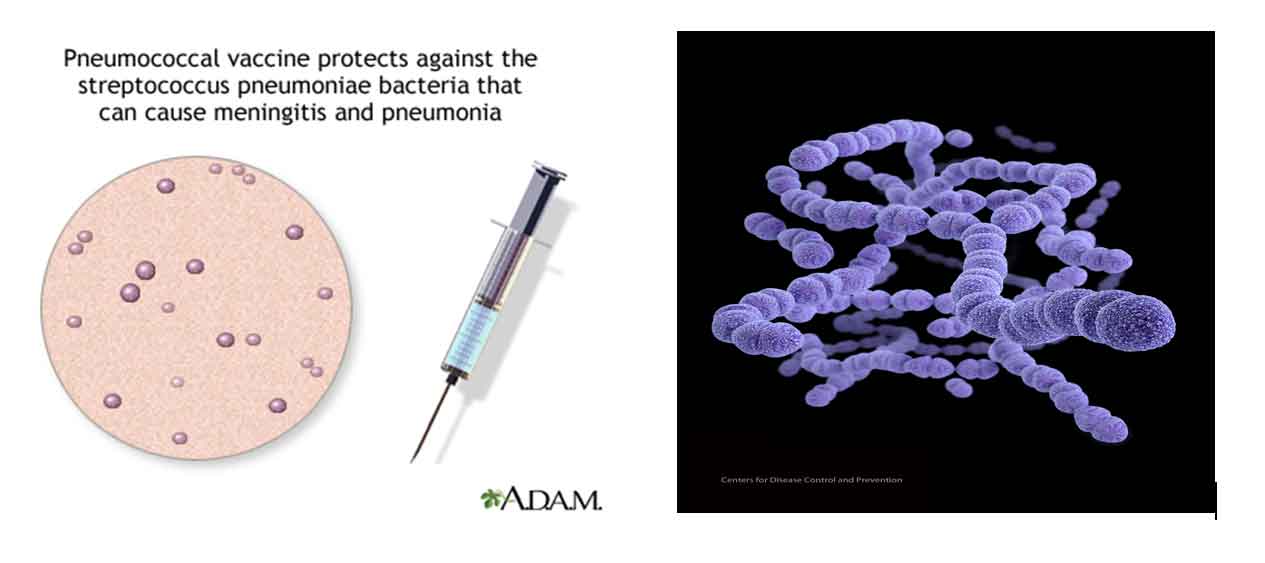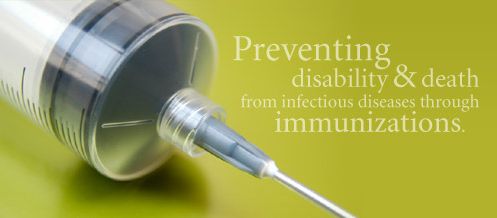What are Pneumococcal Diseases?
Pneumococcal diseases are infections caused by the bacterium called Streptococcus pneumoniae infecting adults and children alike but it affects young children and the elderly more commonly. The bacterium can bring about different types of infections which include lung infections/inflammation (pneumonia), meningitis (inflammation of the membrane surrounding the spinal cord or brain), sepsis (an infection in the blood), sinusitis (infection of the sinuses) and otitis media (middle ear infection).

There are many strains of Streptococcus pneumoniae (around 90 types or serotypes) however only a minority of the strains (about 20 serotypes) are usually responsible for the majority of pneumococcal diseases.
Although antibiotic treatment for pneumococcal diseases is available, some of these strains are resistant to antibiotics. Since pneumococcal disease is a vaccine preventable disease, getting vaccinated is the best option.
Why get vaccinated?
Pneumococcal infections most commonly occur among the very young, the elderly (especially those over 65 years of age) as well as those with chronic medical conditions. Many of these infections are serious and may lead to hospitalisation, permanent disability (deafness, brain damage, or loss of arms or leg) or even death.
In 2008, the World Health Organization (WHO) estimated that out of the 8.8 million worldwide annual deaths amongst children under the age of 5 years, 476 000 (333 000–529 000) cases were due to pneumococcal infections. Mortality and disease rates were found to be higher in developing nations with most deaths reported in Africa and Asia.
In Malaysia, pneumococcal disease is one of the most widespread vaccine preventable diseases. Outcomes of pneumococcal diseases are serious and potentially fatal, hence preventive measures such as vaccination are the best way to prevent pneumococcal disease. In fact vaccination is the first line of defense. Vaccines can help protect from serious illnesses, complications and save lives.
How pneumococcal vaccines work?
Streptococcus pneumoniae can spread easily through contaminated surfaces and from person to person when there is direct contact or through droplets from a sneeze or cough from an infected person. Not everyone who has been exposed to the bacterium, will develop pneumococcal diseases. Some carry the Streptococcus pneumoniae (usually in the nose and throat) without showing any signs of symptoms of the illness themselves but can spread them to non-infected individuals. Children are especially susceptible to such infections.
Vaccines provide protection against many types and strains of bacteria. This will depend on which strains are contained in the vaccine. The pneumococcal vaccine will help stimulate our body to make antibodies against Streptococcus pneumoniae which causes the disease. This is because vaccines contain parts of a bacterium that trigger the body to build its immunity towards the bacterium. Should the person who received the vaccine become infected with the particular strains (serotypes) of Streptococcus pneumoniae, these antibodies then will help protect from illness.
In other words pneumococcal vaccines provide vaccination against pneumococcal diseases caused by those pneumococcal strains included in the vaccine. Pneumococcal vaccines contain the strains that commonly cause the disease.
If vaccines are made from bacteria how can they be safe?
Vaccines either only use parts of a bacteria or the whole bacteria that have been killed or weakened. Since they contain inactive forms of bacteria they are not able to cause the diseases they are preventing.
Pneumococcal Vaccines Available
There are currently two different types of pneumococcal vaccines: pneumococcal polysaccharide vaccine and pneumococcal conjugate vaccine. These vaccines provide protection against the most important strains of Streptococcus pneumoniae as they contain a number of different strains including those most likely to cause serious disease. Adults and children are vaccinated based on the schedule recommended for their age group. It is important to note that as with any vaccine, pneumococcal vaccines will not protect all persons who are vaccinated as immunisations with these vaccines offer prevention only against pneumococcal diseases caused by the Streptococcus pneumoniae strains (serotypes) contained in the respective vaccine.
Table 1: Pneumococcal vaccines available in Malaysia
|
Types of pneumococcal vaccines available
|
Pneumococcal Polysaccharide Vaccine
|
Pneumococcal Conjugate Vaccine
|
||
|---|---|---|---|---|
| Available in Malaysia | PNEUMOVAX 23 VACCINE | PNEUMO 23 POLYVALENT VACCINE | PREVENAR 13 SUSPENSION FOR INJECTION | SYNFLORIX VACCINE |
| Protects against 23 serotypes(strains) of Streptococcus pneumoniae bacteria. | Protects against 13 serotypes(strains) of Streptococcus pneumoniae bacteria | Protects against 10 serotypes(strains) of Streptococcus pneumoniae bacteria | ||
|
Target population/group Who can/should receive the vaccine? |
If below 2 yrs old are at high risk (immunocompromised), they should first receive pneumococcal |
|
Children from 6 weeks to 5 years of age. | |
| Route of administration | Injected into a muscle (thigh or arm) or under the surface of the skin. | Injection into a muscle (thigh or upper arm) | ||
|
Dosing
|
A single dose (0.5ml); Timing of vaccination will depend on the specific risk of their underlying condition. Revaccination possible/required in some individuals* |
Each dose: 0.5 ml Infants aged 2-6 months Three-dose primary series with booster – 3 doses. Two-dose primary series with booster. Unvaccinated infants and children = 7 months of age 7-11 months: 2 doses** Children and adolescents aged 2 years to 17 years: Adults aged 50 years and older (including those previously vaccinated with a pneumococcal polysaccharide vaccine): |
Each dose: 0.5 ml Infants aged 6 weeks-6 months Three-dose primary series with booster 3 doses** Two-dose primary series with booster 2nd dose: 2 months later. Booster dose :=6 months after the last primary dose Preterm infants born after at least 27 weeks of gestational age Booster dose: = 6 months after the last primary dose Previously unvaccinated older infants and children: 12-23 months: 2 doses # Booster dose: not established. 24 months – 5 years: |
|
| Use with other vaccines* | Can be given at the same time with certain vaccines as long as different injection sites are used | |||
* discuss options with healthcare provider
** interval of at least 1 month between doses
# interval of at least 2 month between doses
Possible Adverse Reactions/ Side effects
Pneumococcal vaccines are safe and generally well tolerated. However side effects can occur, although not everybody gets them.
The most common side effects are pain, redness, swelling at the injection site and low grade fever.
Children receiving pneumococcal conjugate vaccine also may experience decreased appetite, irritability, drowsiness and restless sleep.
Rarely, a child or adult may have a serious allergic reaction after pneumococcal vaccination which may include the following:
- difficulty in breathing,
- low blood pressure (causing dizziness) and collapse,
- rapid heartbeat
- swelling of the face, lips, tongue and/or throat and neck,
- hives (inflamed wheals on the skin) and rashes.
These reactions usually manifest a few minutes to a few hours after the vaccination and urgent medical assistance is required.
Any adverse event following vaccination should be reported directly to National Centre for Adverse Drug Reactions Monitoring of National Pharmaceutical Control Bureau via online, by fax or ordinary mail on prepaid forms. The form is available on the website of the National Pharmaceutical Control Bureau http://www.bpfk.gov.my/
Consider getting vaccinated

Although pneumococcal vaccination is optional and has not become part of our routine immunization schedule (National Immunization Programme) by the Ministry of Health Malaysia, it is nonetheless, one of the vaccines that is recommended by the Ministry of Health.
Pneumococcal diseases continue to cause death and disability globally. Therefore preventive measures such as vaccination are important in ensuring you and your loved ones are not affected and are adequately protected.
Before receiving pneumococcal vaccine or any other vaccine, the available options should be discussed with a healthcare provider in order to help you make an informed decision to vaccinate against vaccine preventable diseases such as pneumococcal disease.
References
- Aljunid, S., Abuduxike, G., Ahmed, Z., Sulong, S., Nur, A.M., and Goh, A. (2011) Impact of routine PCV7 (Prevenar) vaccination of infants on the clinical and economic burden of pneumococcal disease in Malaysia. BMC Infect Dis.2011; 11: 248
- Centers for Disease Control and Prevention (n.d.). Pneumococcal Conjugate (PCV13) Vaccine Information Statements. Retrieved on February 17, 2015 from http://www.cdc.gov/vaccines/hcp/vis/vis-statemetns/pcv13.html
- Centers for Disease Control and Prevention (n.d.). Pneumococcal Disease. Retrieved on February 17, 2015 from http://www.cdc.gov/pneumococcal/index.html
- Centers for Disease Control and Prevention (n.d.). Pneumococcal Polysaccharide Vaccine Information Statements. Retrieved on February 17, 2015 from http://www.cdc.gov/vaccines/hcp/vis/vis-statements/ppv.html
- Department of Health and Ageing Staff (2013) The Australian Immunisation Handbook 10th Edition. Retrieved from
http://www.immunise.health.gov.au/internet/immunise/publishing.nsf/Content/EE1905BC65D40BCFCA257B26007FC8CA/$File/handbook-Jan2014v2.pdf - Kementerian Kesihatan Malaysia (2012) Paediatric Protocols for Malaysian Hospitals Third Edition. Retrieved from http://www.mpaweb.org.my/article.php?aid=458
- Lynch, J.P III, Zhanel, G.G.(2010) Streptococcus pneumoniae: epidemiology and risk factors, evolution of antimicrobial resistance, and impact of vaccines. Curr Opin Pulm Med.16 (3):217-225.
- Pharmaceutical Research and Manufacturers of America (2013) PHRMA Vaccine Fact Book 2013. Retrieved from http://www.phrma.org/sites/default/…/PhRMA_Vaccine_FactBook_2013.pdf
- Pneumococcal vaccine (n.d). .[Digital image]. Retrieved on February 27, 2015 from the website: http://www.nlm.nih.gov/medlineplus/ency/imagepages/9767.htm
- Preventing disability and death from infectious diseases through immunisations (n.d). .[Photograph]. Retrieved on February 27, 2015 from the website: http://healthparkpharmacy.com/new-pneumonia-vaccine-fact-or-fiction/
- Streptococcus pneumonia.[Medical illustration]. Retrieved on February 25, 2015 from the Centers for Disease Control and Prevention (CDC) website: http://www.cdc.gov/media/subtopic/library/diseases.htm
- World Health Organization (2012) Pneumococcal vaccines. WHO position paper. Retrieved from http://www.who.int/wer/2012/wer8714.pdf
- World Health Organization (n.d.) Pneumococcal disease. Retrieved from http://www.who.int/ith/diseases/pneumococcal/en/
| Last Reviewed | : | 17 June 2015 |
| Writer | : | Cynthia Albert Gunaratham |
| Accreditor | : | Dr. Yvonne Khoo Siew Khoon |







